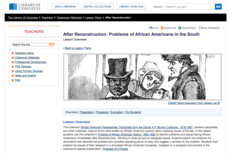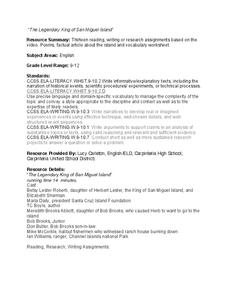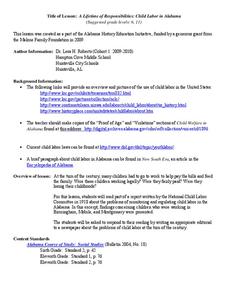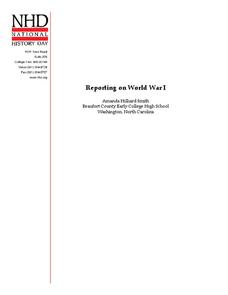ReadWriteThink
Biography Project: Research and Class Presentation
I Have A Dream ... that after the lesson, all individuals master the reading, writing, researching, listening, and speaking skills the biography project helps them develop. Martin Luther King, Jr. serves as a topic example for a model...
ReadWriteThink
Persuasive Essay: Environmental Issues
Young environmentalists learn how to craft a persuasive essay about an environmental issue they consider important. After studying the components of a persuasive essay and examining a student model, writers brainstorm possible topics and...
Maryland Department of Education
The Concept of Identity Lesson 2: The Historical/Biographical Approach
"How does our environment shape our identity?" After researching biographical information about John Knowles and considering how these experiences are reflected in A Separate Peace, class members consider the strengths and weaknesses of...
Alabama Department of Archives and History
America in Space: German Voices from Huntsville, Alabama
Project Paperclip, the Redstone Arsenal, and the Huntsville Space Center are all featured in a resource that investigates the contributions of Dr. Werner von Brawn and other German scientists to the US space program....
Orlando Shakes
Les Misérables: Study Guide
A writer has the responsibility to defend the less fortunate members of society. At least that was the view of Victor Hugo, author of Les Miserables. The novel is the subject of a study guide from Orlando Shakespeare Theater....
Alabama Department of Archives and History
A College Student's Perspective on WWI
Some things remain the same, such as the world being on the brink of war, or college attendees writing home requesting money. As part of their research into events that led up to President Wilson's declaration of war on...
National History Day
Challenging the Status Quo: Women in the World War I Military
Why are some so resistant to change? The status quo is often to blame for a lack of forward movement in society. Following the events of World War I, women in America suddenly had a voice—and were going to use it. Scholars use the...
Prestwick House
Understanding Language: Slant, Spin, and Bias in the News
We live in a time of fake news, alternative realities, and media bias. What could be more timely than an activity that asks class members to research how different sources report the same topic in the news?
Sharp School
Horror Fiction Multimedia Project
"There comes an end to all things" and ending a study of horror fiction with a multimedia project is "like starting a stone. . . away the stone goes, starting others. . ." In this case, groups start with a question generated by Dr....
Houghton Mifflin Harcourt
The Old Man and the Sea Ernest Hemingway
Accompany a reading of Ernest Hemingway's The Old Man and the Sea with a thorough literature packet. Although the materials are meant to prepare readers for a timed essay, the background information and the activities are...
Library of Congress
After Reconstruction: Problems of African Americans in the South
Lynchings, race riots, and Jim Crow laws were just a few examples of antagonism that African Americans faced after Emancipation. Class groups investigate these and other events, and prepare a presentation to inform the class about...
National History Day
Why Did the United States Enter World War I in 1917?
World War I was the first major conflict on a global scale. Using primary documents, learners determine why the United States chose to enter World War I when it did. After analytical writing and group research, the causes of America's...
Channel Islands Film
The Legendary King of San Miguel: Lesson Plan 3 - Grades 9-12
The documentary, The Legendary King of San Miguel Island, introduces the fascinating tale of Herb Lester, his family, and their life on San Miguel Island. Viewers have an opportunity to expand their study of the island and of...
Curated OER
Guess Who's Coming to Dinner?
Who would you love to see at your table? Groups research a decade, ranging from the 1840s to the 1960s, read a short story associated with that decade, and plan a dinner party, complete with table set-up and menu. After researching...
Library of Congress
Industrial Revolution
Could you live without your phone? What about cars, steel, or clothing? Class groups collaborate to produce presentations that argue that either the telephone, the gramophone, the automobile, the textile industry, or the steel...
Alabama Department of Archives and History
A Lifetime of Responsibilities: Child Labor in Alabama
Imagine children working long hours in factories, coal mines, and in the fields. Class members examine a series of pictures and read about early attempts to regulate child labor and current child labor laws.
National History Day
Reporting on World War I
Throughout history, newspapers have reported the events of the day as they unfolded. Using primary and secondary sources from World War I, scholars uncover how the American people learned of the events of the War to End All Wars. History...
Curated OER
About Life: The Photographs of Dorothea Lange Going to the Promised Land
To better understand the migrant experience during the Great Depression, pupils analyze two primary resources: photographs by Dorothea Lange and a U.S. Map that shows the Dust Bowl. They compare and contrast Lange's images to Steinbeck's...
Alabama Department of Archives and History
A Worse Death: War or Flu?
In a lesson plan that integrates history and mathematics, class members create graphs that compare military death statistics from World War I with those that resulted from the influenza pandemic of 1918.
Alabama Department of Archives and History
Alabama's Steps to Statehood
To demonstrate their understanding of the steps Alabama took to become a state, groups create a poster that identifies what the United States Constitution and the Northwest Ordinance required of a territory to become a state.
Alabama Department of Archives and History
Alabama's New South Era
The industrialization and urbanization of Alabama during the New South era (1865-1914) is the focus of a lesson that asks class members to use primary source documents to examine the impact of industrialization on Alabama workers and...
Alabama Department of Archives and History
Alabama's Secession in 1861: Embraced with Joy and Great Confidence. Why?
From December 20, 1860 to June 8, 1861, eleven states seceded from the Union. Alabama seceded on January 11, 1861. Why did so many white Alabamians want to secede? Why did they believe the South could win the war? These are the essential...
Alabama Department of Archives and History
Convict Leasing in Alabama: a System That Re-Enslaved Blacks After the Civil War
The post-Civil War convict leasing program, rarely covered in textbooks, is the focus of a instructional activity that asks class members to use information drawn from primary source documents to assess the program. While the focus is on...
Council for Economic Education
Green Eggs and ...Economics?
Scholars use four different children's books by Dr. Seuss to analyze microeconomic concepts. Group presentations and research help them better understand simple economic concepts through simple stories.























